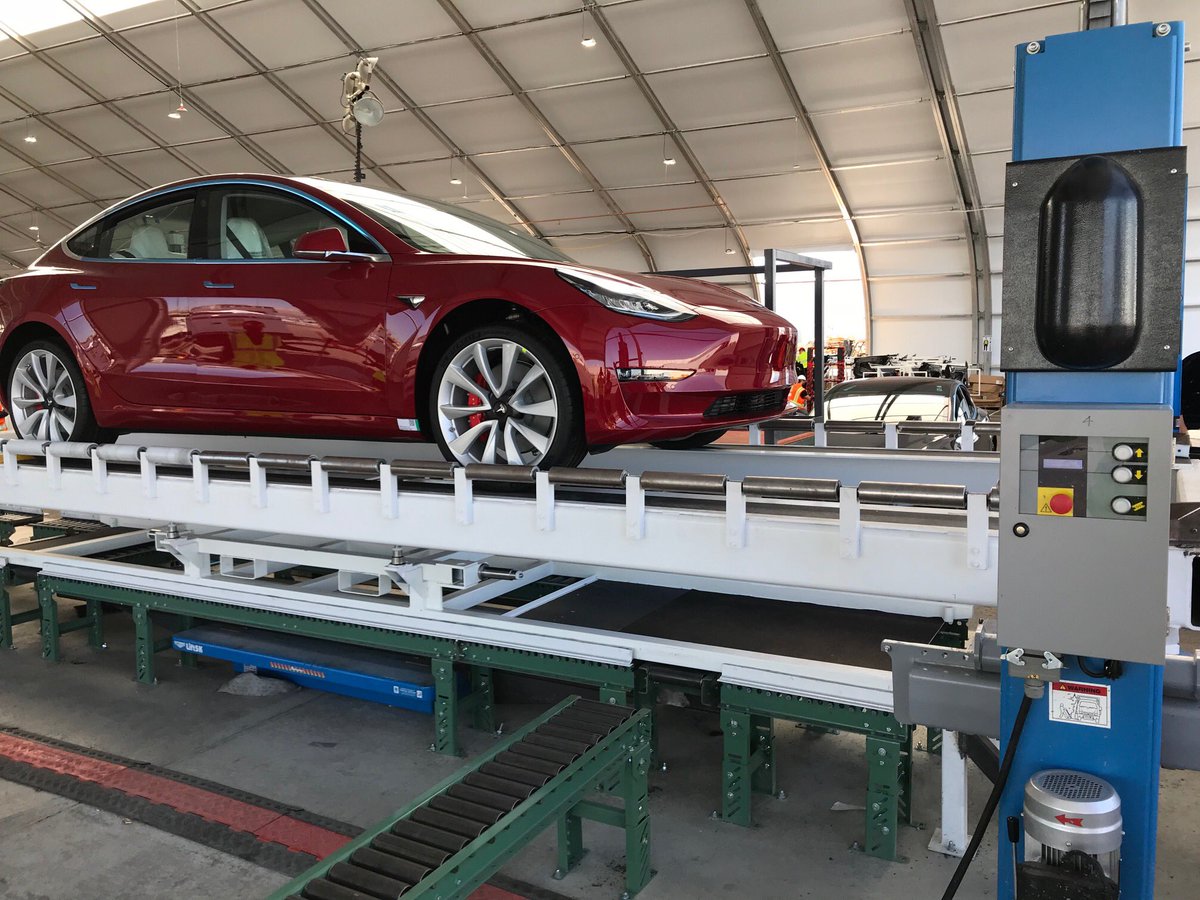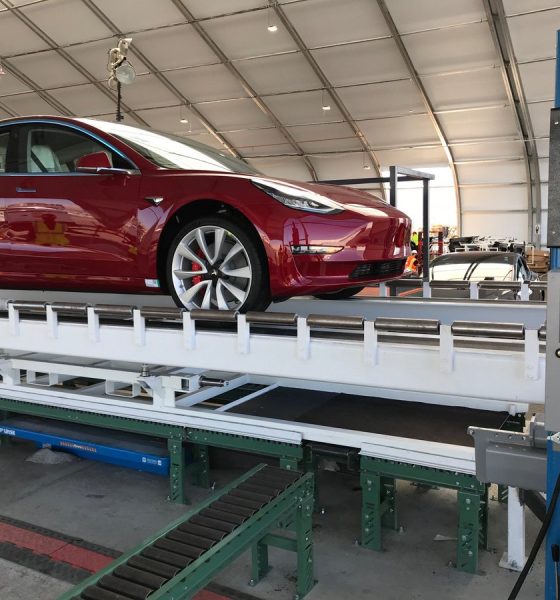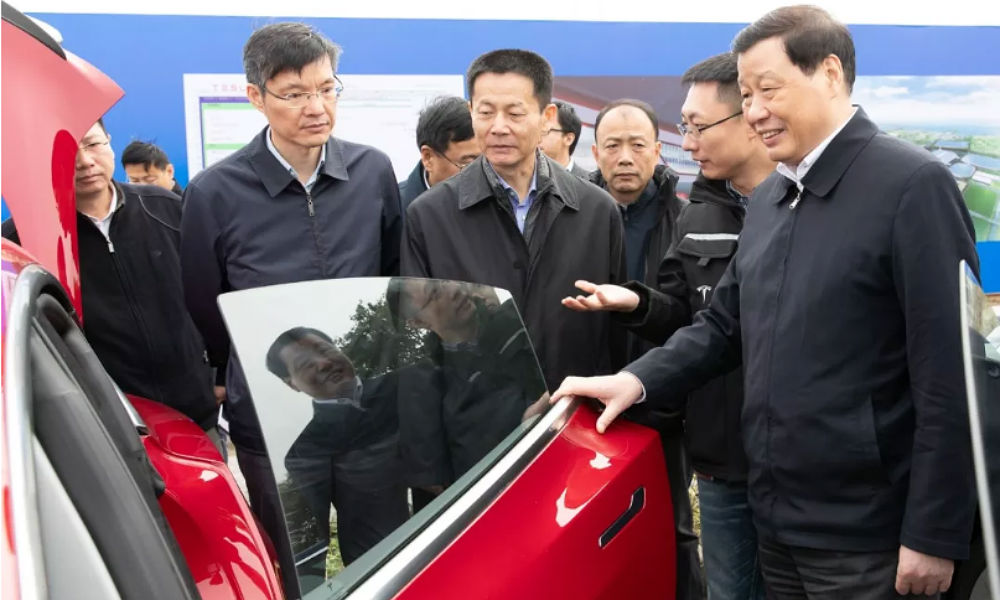

Investor's Corner
Tesla Model 3 production in Gigafactory 3 to begin in second half of 2019: report
The development of Tesla’s Gigafactory 3 continues to move at a rapid pace, with recent reports suggesting that electric car production in the upcoming facility could begin as early as the second half of 2019. Provided that there are no delays in the construction of the factory itself, and provided that Tesla can ship and set up its production lines on time, the latter half of 2019 could signal the beginning of Model 3 production in China.
Local media outlet Caijing.com noted that the factory is about to begin construction, particularly since the 864,885-square meter plot of land in the Lingang Industrial Zone has been leveled. In a post on its official WeChat account, the Shanghai government further indicated that Mayor Ying Yong and Vice Mayor Wu Qing have met with Tesla’s leaders in China while checking the company’s new vehicles like the Model 3. During their visit, the Shanghai officials reportedly encouraged parties involved in the project to expedite the construction of Gigafactory 3 even more.

The progress of Tesla’s Gigafactory 3 has been nothing short of remarkable. When Elon Musk announced the target timeline for the project earlier this year, the company’s critics were immediately skeptical. Tesla initially noted that vehicle production in Gigafactory 3 would start roughly two years after the facility’s construction begins, ramping to an output of 500,000 vehicles per year 2-3 years after. The timeline, which could only be described as classic Elon Musk, was met with doubts from Wall Street. Consumer Edge Research senior auto analyst James Albertine, for one, dubbed Gigafactory 3’s timeline as “not feasible.”
Despite its initial timeline already being met by raised eyebrows from Wall Street, Tesla announced an even more aggressive target for the project after its stellar third quarter. In its Q3 vehicle production and deliveries report, Tesla noted that it was accelerating the construction of Gigafactory 3. The company also noted that it expects the facility’s construction to be rapid and capital-efficient, thanks to lessons learned from the Model 3 ramp in the United States.
Beyond the lessons from the Model 3 ramp, credit is due to the Chinese government for its support for Tesla and the upcoming factory. Local state media has been openly supportive of the project and Tesla as a whole, and the government even bent its rules a little by allowing the electric car maker to become the sole owner of Gigafactory 3. The government’s support became particularly evident when Tesla went unchallenged in its bid for an 864,885-square meter plot of land in Shanghai’s Lingang area, as well as in the rapid release of low-interest loans for the project from local Shanghai banks.
November 29th 2018, Tesla Direct Experience Center officially grand opening at the Wenzhou Fortune Experience Center. To date, Tesla has more than 44 direct experience centers and service centers in mainland China 🇨🇳 .$TSLA #Tesla #China #TeslaChina pic.twitter.com/X8nJHVJCNz
— vincent (@vincent13031925) November 30, 2018
The Chinese government’s favor for Tesla has allowed the company to maintain a strong brand in the country, despite challenges posed by a 40% import tariff placed on the Model S and Model X due to the trade war between China and the United States. Even before US President Donald Trump announced on Twitter that the Chinese government has agreed to “reduce and remove” import tariffs on vehicles from the United States, Tesla’s electric cars, particularly the Model 3, have been garnering a lot of interest among Chinese consumers. This interest became evident during a recent job fair at the Lingang Industrial Zone, when Tesla was forced to extend its hiring hours due to the overwhelming number of applicants for job openings at Gigafactory 3.
Considering China’s reputation for building large-scale facilities in record time, an initial Model 3 production run in Gigafactory 3 by the second half of 2019 is actually quite feasible. With the country’s capability to construct the facility quickly, the start of Model 3 production in China next year would likely be limited only by Tesla’s capability to ship and set up its vehicle production lines on time. If Tesla can accomplish this, there is very little that can go in the way of Gigafactory 3 producing the Model 3 for the local Chinese market before 2019 ends.
Tesla has the potential to be a force in China’s auto market, particularly as the country is aggressively pushing the electrification of its transport sector. China is on track to sell 2 million electric vehicles by 2020 and attain an ICE to EV ratio of 1:1 by 2030. Tesla’s Gigafactory 3, which is expected to produce 500,000 cars per year, could go a long way in helping the country achieve its own ambitious electric car goals, particularly as the company is expected to produce its two mass-market vehicles in the facility — the Model 3 sedan and the Model Y SUV.

Elon Musk
Tesla stock gets latest synopsis from Jim Cramer: ‘It’s actually a robotics company’
“Turns out it’s actually a robotics and Cybercab company, and I want to buy, buy, buy. Yes, Tesla’s the paper that turned into scissors in one session,” Cramer said.

Tesla stock (NASDAQ: TSLA) got its latest synopsis from Wall Street analyst Jim Cramer, who finally realized something that many fans of the company have known all along: it’s not a car company. Instead, it’s a robotics company.
In a recent note that was released after Tesla reported Earnings in late January, Cramer seemed to recognize that the underwhelming financials and overall performance of the automotive division were not representative of the current state of affairs.
Instead, we’re seeing a company transition itself away from its early identity, essentially evolving like a caterpillar into a butterfly.
The narrative of the Earnings Call was simple: We’re not a car company, at least not from a birds-eye view. We’re an AI and Robotics company, and we are transitioning to this quicker than most people realize.
Tesla stock gets another analysis from Jim Cramer, and investors will like it
Tesla’s Q4 Earnings Call featured plenty of analysis from CEO Elon Musk and others, and some of the more minor details of the call were even indicative of a company that is moving toward AI instead of its cars. For example, the Model S and Model X will be no more after Q2, as Musk said that they serve relatively no purpose for the future.
Instead, Tesla is shifting its focus to the vehicles catered for autonomy and its Robotaxi and self-driving efforts.
Cramer recognizes this:
“…we got results from Tesla, which actually beat numbers, but nobody cares about the numbers here, as electric vehicles are the past. And according to CEO Elon Musk, the future of this company comes down to Cybercabs and humanoid robots. Stock fell more than 3% the next day. That may be because their capital expenditures budget was higher than expected, or maybe people wanted more details from the new businesses. At this point, I think Musk acolytes might be more excited about SpaceX, which is planning to come public later this year.”
He continued, highlighting the company’s true transition away from vehicles to its Cybercab, Optimus, and AI ambitions:
“I know it’s hard to believe how quickly this market can change its attitude. Last night, I heard a disastrous car company speak. Turns out it’s actually a robotics and Cybercab company, and I want to buy, buy, buy. Yes, Tesla’s the paper that turned into scissors in one session. I didn’t like it as a car company. Boy, I love it as a Cybercab and humanoid robot juggernaut. Call me a buyer and give me five robots while I’m at it.”
Cramer’s narrative seems to fit that of the most bullish Tesla investors. Anyone who is labeled a “permabull” has been echoing a similar sentiment over the past several years: Tesla is not a car company any longer.
Instead, the true focus is on the future and the potential that AI and Robotics bring to the company. It is truly difficult to put Tesla shares in the same group as companies like Ford, General Motors, and others.
Tesla shares are down less than half a percent at the time of publishing, trading at $423.69.
Elon Musk
Tesla to a $100T market cap? Elon Musk’s response may shock you

There are a lot of Tesla bulls out there who have astronomical expectations for the company, especially as its arm of reach has gone well past automotive and energy and entered artificial intelligence and robotics.
However, some of the most bullish Tesla investors believe the company could become worth $100 trillion, and CEO Elon Musk does not believe that number is completely out of the question, even if it sounds almost ridiculous.
To put that number into perspective, the top ten most valuable companies in the world — NVIDIA, Apple, Alphabet, Microsoft, Amazon, TSMC, Meta, Saudi Aramco, Broadcom, and Tesla — are worth roughly $26 trillion.
Will Tesla join the fold? Predicting a triple merger with SpaceX and xAI
Cathie Wood of ARK Invest believes the number is reasonable considering Tesla’s long-reaching industry ambitions:
“…in the world of AI, what do you have to have to win? You have to have proprietary data, and think about all the proprietary data he has, different kinds of proprietary data. Tesla, the language of the road; Neuralink, multiomics data; nobody else has that data. X, nobody else has that data either. I could see $100 trillion. I think it’s going to happen because of convergence. I think Tesla is the leading candidate [for $100 trillion] for the reason I just said.”
Musk said late last year that all of his companies seem to be “heading toward convergence,” and it’s started to come to fruition. Tesla invested in xAI, as revealed in its Q4 Earnings Shareholder Deck, and SpaceX recently acquired xAI, marking the first step in the potential for a massive umbrella of companies under Musk’s watch.
SpaceX officially acquires xAI, merging rockets with AI expertise
Now that it is happening, it seems Musk is even more enthusiastic about a massive valuation that would swell to nearly four-times the value of the top ten most valuable companies in the world currently, as he said on X, the idea of a $100 trillion valuation is “not impossible.”
It’s not impossible
— Elon Musk (@elonmusk) February 6, 2026
Tesla is not just a car company. With its many projects, including the launch of Robotaxi, the progress of the Optimus robot, and its AI ambitions, it has the potential to continue gaining value at an accelerating rate.
Musk’s comments show his confidence in Tesla’s numerous projects, especially as some begin to mature and some head toward their initial stages.
Elon Musk
Tesla director pay lawsuit sees lawyer fees slashed by $100 million
The ruling leaves the case’s underlying settlement intact while significantly reducing what the plaintiffs’ attorneys will receive.

The Delaware Supreme Court has cut more than $100 million from a legal fee award tied to a shareholder lawsuit challenging compensation paid to Tesla directors between 2017 and 2020.
The ruling leaves the case’s underlying settlement intact while significantly reducing what the plaintiffs’ attorneys will receive.
Delaware Supreme Court trims legal fees
As noted in a Bloomberg Law report, the case targeted pay granted to Tesla directors, including CEO Elon Musk, Oracle founder Larry Ellison, Kimbal Musk, and Rupert Murdoch. The Delaware Chancery Court had awarded $176 million to the plaintiffs. Tesla’s board must also return stock options and forego years worth of pay.
As per Chief Justice Collins J. Seitz Jr. in an opinion for the Delaware Supreme Court’s full five-member panel, however, the decision of the Delaware Chancery Court to award $176 million to a pension fund’s law firm “erred by including in its financial benefit analysis the intrinsic value” of options being returned by Tesla’s board.
The justices then reduced the fee award from $176 million to $70.9 million. “As we measure it, $71 million reflects a reasonable fee for counsel’s efforts and does not result in a windfall,” Chief Justice Seitz wrote.
Other settlement terms still intact
The Supreme Court upheld the settlement itself, which requires Tesla’s board to return stock and options valued at up to $735 million and to forgo three years of additional compensation worth about $184 million.
Tesla argued during oral arguments that a fee award closer to $70 million would be appropriate. Interestingly enough, back in October, Justice Karen L. Valihura noted that the $176 award was $60 million more than the Delaware judiciary’s budget from the previous year. This was quite interesting as the case was “settled midstream.”
The lawsuit was brought by a pension fund on behalf of Tesla shareholders and focused exclusively on director pay during the 2017–2020 period. The case is separate from other high-profile compensation disputes involving Elon Musk.








